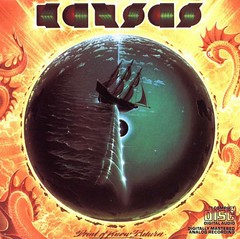 I've just finished Michio Kaku's Physics of the Future. In this work, Kaku describes the state of science, technology, and engineering in the areas of computation, artificial intelligence, medicine, nanotechnology, energy, space travel, the meaning of wealth, and the future of human civilization. He then extends this discussion to speculate on the shape of each discipline and the consequences for life and civilization in the long (2070-2100), mid (2030-2070), and near (present to 2030) terms.
I've just finished Michio Kaku's Physics of the Future. In this work, Kaku describes the state of science, technology, and engineering in the areas of computation, artificial intelligence, medicine, nanotechnology, energy, space travel, the meaning of wealth, and the future of human civilization. He then extends this discussion to speculate on the shape of each discipline and the consequences for life and civilization in the long (2070-2100), mid (2030-2070), and near (present to 2030) terms.
I don't want to dwell on the aspects of Kaku's work that bother me, but I can't resist (very) briefly touching on a few.
- I'm always a little troubled by the inveterate optimism of some folks (especially those with an unshakable faith in science to make the world better). This is some of my own pessimism and misanthropy coming through, so my judgement should come with a grain of salt. I'm not asking for dystopic visions of the future, but Kaku is really unbalanced in his approach.
- My teeth always start to ache when physicists start talking about international relations, psychology, economics and other fields in which they are (at best) dilettantes. (To be fair, I'm similarly troubled when experts in international relations betray their misunderstanding of science.) Kaku has a lot to say on these subjects and the pedigree of his conclusions sets off alarms in my little dilettante brain.
- Kaku completely ignores a fundamental aspect of human interaction--war. (Of course, my calling this element of human interaction fundamental betrays my Hobbesian outlook, but "to thine own self be true.") This gap is filled, to an extent, by others. (E.g., The Next 100 Years: A Forecast of the 21st Century by George Friedman is a nice look at the interaction of technology, social change, geopolitics, and war. Robert Kaplan does some of the same things, though with a lens that doesn't seek to see quite so far. Etc.) I just wish a survey of science as wide-ranging as Kaku's touched on military science as well. (Discursive aside...I think it bears mentioning that any discipline using "science" as a noun modified by some discipline-related word--in a quest for the illusion of rigor that only comes from science in our post-enlightenment minds--will never be an actual science. Just saying.)
So...1) Can we meaningfully incorporate these speculations into force structure analysis? 2) Should we do so? 3) If so, how would such speculative force structure analysis work?
Merf




